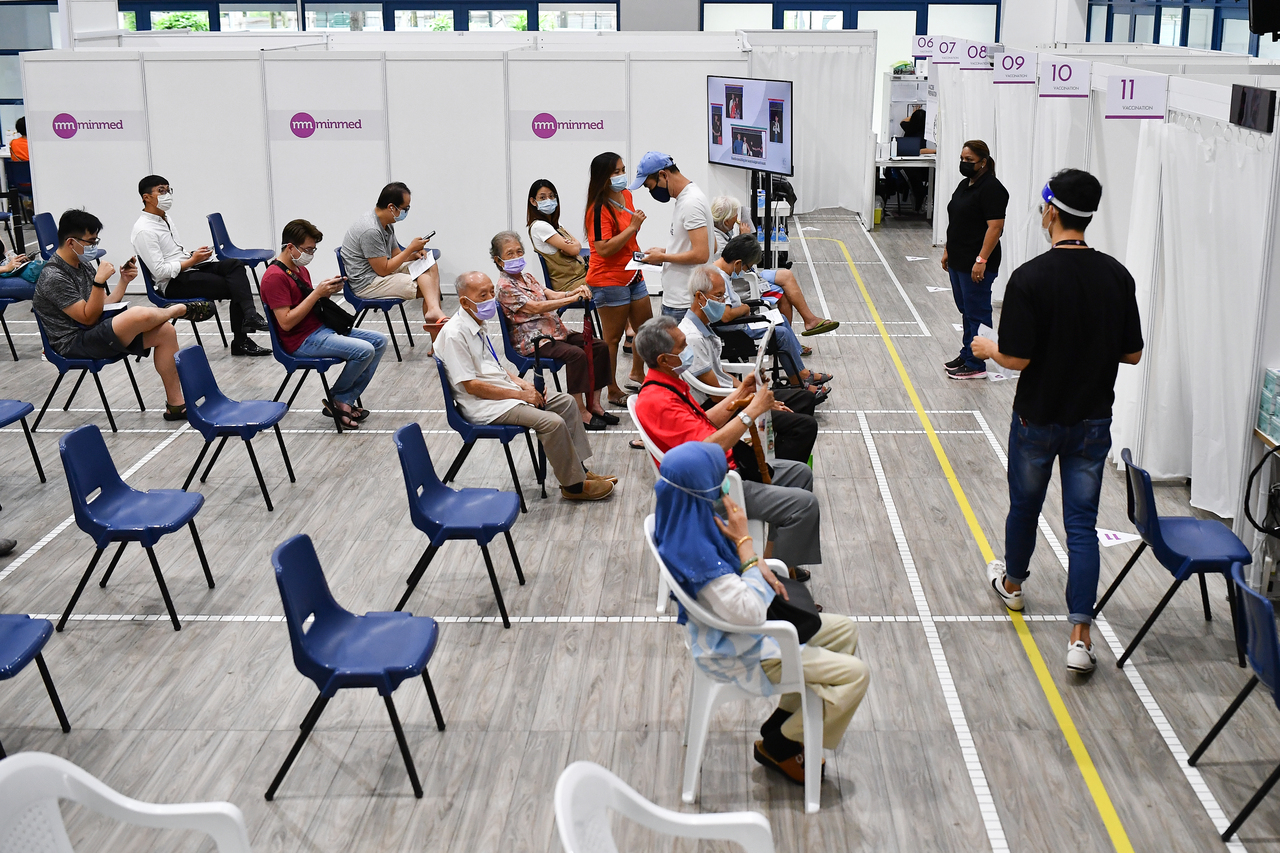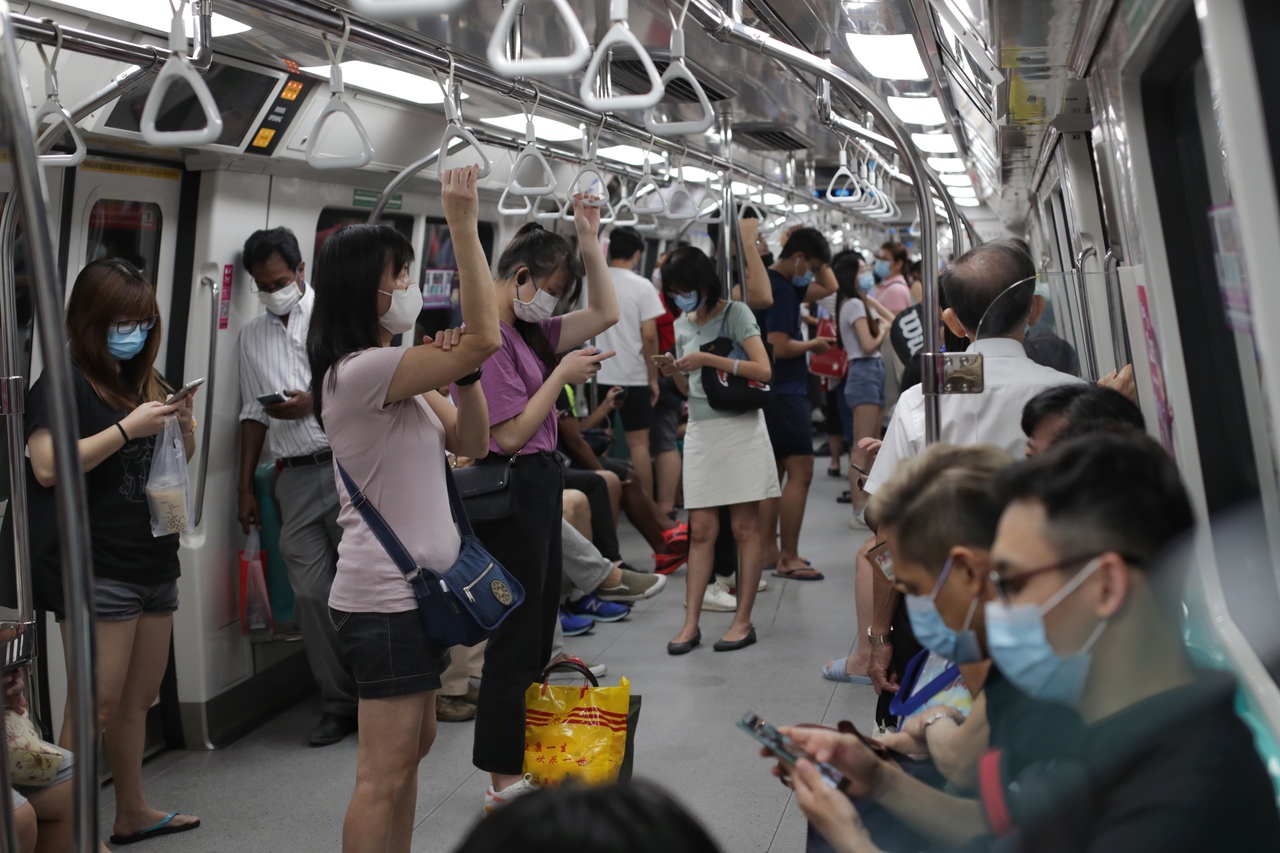Not the end of pandemic woes: Expert says Singapore could be seeing 1,000 cases a day in 2 to 3 weeks' time


SINGAPORE - Singapore recently crossed a significant milestone, having fully vaccinated more than 80 per cent of its population.
This was the target the Multi Ministry Taskforce (MTF) had set as a precondition to easing restrictions further as Singapore moves towards treating Covid-19 as an endemic disease.
Unfortunately, the way things have panned out, reaching this target no longer spells the end of pandemic woes.
Hence, the MTF's decision last week to continue monitoring the situation instead of further relaxing measures.
Over the past fortnight, the number of new locally transmitted cases crosses 100 on most days and occasionally goes above 200.
Associate Professor Alex Cook, vice dean research at the NUS Saw Swee Hock School of Public Health, said that at the current rate of infection, with no easing or tightening of measures, Singapore could be seeing 1,000 cases a day in two to three weeks' time.
This will be caused in large part, by the high number of unlinked cases in the community.
Unlinked cases are of concern since they are infected from unknown sources. So 100 unlinked cases means there may be 100 infectors we do not know of, who might still be spreading the disease to others.
What these numbers tell us is that in spite of high vaccination rates and measures such as restricting the number of people allowed to dine in together - five in restaurants and two at hawker centres - the disease is still spreading.
So why isn't a high vaccination rate delivering the anticipated results? Is there anything that will? Or will the world remain in a state of constant lockdowns, or face high numbers of serious illness and deaths?
The truth of the matter is that the Covid-19 landscape is not static. If the world was still facing the original virus that emerged from Wuhan in December 2019, the current vaccines would have worked well in suppressing the disease.
But the virus has undergone thousands of mutations since then. The dominant strain now circulating is the Delta variant. Other new strains, like Lambda or Mu, may emerge in future to throw more spanners in the works.
Such mutations are something that Singapore, and the world, has to learn to deal with.
The Delta variant that is dominant in the world today is far more transmissible than the original strain that emerged in Wuhan in December 2019.
Where the original virus spreads, on average, from one person to 2.5 others, the Delta strain would spread to five or more people.
If Delta had emerged one year back, instead of appearing only around April this year, the fallout would have been catastrophic.
There would have been a huge difference in the number of people infected, had Delta spread before the vast majority of the population was vaccinated, said Prof Cook.
With a base population of 5.7 million unvaccinated people and starting with one case of each, at the end of a month, the original virus would have spread to 1,525 people. In contrast, one case of the Delta variant would have infected 366,572 people.
Said Prof Cook: "I'm confident that if Delta had not showed up, we would have next to no community cases right now."
But Delta did show up and its higher transmission rate is the reason that the number of infections and unlinked cases remains high, despite measures in place.
The Delta variant also increases the chances of people getting severely ill.
The current vaccines were produced based on the original virus and are generally less effective against the Delta variant.
Most studies put mRNA vaccine efficacy against Delta in the 64-88 per cent range - against the 95 per cent efficacy from the clinical trials.
This also means that more people are likely to suffer from serious illness and death if infected.
An article in The Lancet Infectious Diseases on a Public Health England study published on August 27 found that patients with the Delta variant had more than two times the risk of hospital admission compared with patients with an earlier alpha variant.
Given that Delta is the main variant in the world today, what are the options open to Singapore? Should it relax measures as planned, open up its border more, and allow life to approach pre-Covid-19 times?
Or should it maintain current measures for a few more months to allow for more people to be vaccinated, and those at high risk given a third vaccine jab to boost their antibody levels?
Neither option is ideal and both come with risks.
Professor Paul Tambyah, a senior infectious diseases consultant at the National University Hospital (NUH) said: "This is a policy question and not a medical question."
He added: "Policies which need to balance economic versus perceived public health benefits need to be decided upon by the leaders based on considerations that are important to them."
Close to one in five people here are yet to be fully vaccinated. This puts them at greater risk of infection and serious illness.
About half of them are children under the age of 12 years, for whom there is currently no approved vaccine. While their risk of getting infected is there and they can pass the disease on to others, the children themselves are far less likely to fall seriously ill.
But the other unvaccinated people face significant risk of serious illness and perhaps death.
Associate Professor Hsu Li Yang, an infectious diseases expert at the NUS Saw Swee Hock School of Public Health, suggested offering vaccine-hesitant people more traditional, though less effective, vaccines to persuade them to get jabbed.
For instance, they could be offered vaccines from China - since "any vaccine is better than no vaccine".
[[nid:541372]]
Another article in the Lancet journal on September 1, found the risk of infection was two-thirds less in people who have been fully vaccinated.
Similarly, the odds of long Covid-19 where symptoms last for 28 days or longer, is more than halved in fully vaccinated people.
The study concluded: "Almost all symptoms were reported less frequently in infected vaccinated individuals than in infected unvaccinated individuals, and vaccinated participants were more likely to be completely asymptomatic, especially if they were 60 years or older."
So people who have been vaccinated have significant protection against severe illness and death - which is the primary purpose of vaccination.
These reports are borne out by cases here. The Ministry of Health (MOH) said on Sunday: "Over the last 28 days, the percentage of unvaccinated (people) who became severely ill or died is 6.7 per cent, while that for the fully vaccinated is 0.9 per cent."
Relaxing measures and opening up borders may cause a surge in infections as barriers to the spread of the virus will be removed.
Even countries with high vaccination rates saw an explosion of cases when they had few curbs in place.
When cases in Israel fell to double digit numbers after two thirds of its population had been vaccinated, it lifted restrictions. But masks were reimposed shortly after when infections started to rise.
Israel is now seeing thousands of infections daily, after topping 20,000 infections on September 1. Israel has about 50 per cent more people than Singapore.
So Singapore too can expect to face a surge in cases once measures are lifted.
However, the Ministry of Health (MOH) said that among infected people who have been fully vaccinated, more than 99 per cent were asymptomatic or only mildly ill.

Eventually, the spread of the disease in the population is inevitable. But this may not be a bad thing, said Professor Ooi Eng Eong, who co-directs the Viral Research and Experimental Medicine Centre at the SingHealth Duke-NUS Academic Medical Centre.
He said: "If one then gets asymptomatically infected, then it's the best thing that can happen for immunity - we will then develop immune response to the rest of the virus and not just to the spike gene.
"If we are worried about new variants, asymptomatic infection after vaccination is the way to go."
But he admits: "Letting the virus spread will take a lot of guts. Obviously, this is harder to control and is easier to conceptualise theoretically than to implement."
MTF is also concerned about the healthcare system getting overwhelmed, as has happened in some countries. That would lead to poorer healthcare outcomes.
But Professor Dale Fisher, also a senior infectious diseases consultant at the NUH, said: "Singapore's health system is very robust.
"While it is always a concern, one cannot forget the price being paid for the ongoing restrictions in terms of those with businesses being affected and loved ones they can't see."
According to the latest MOH release, there are 653 people with Covid-19 infections who are hospitalised, though "most are well and under observation".
It added: "There are currently 24 cases of serious illness requiring oxygen supplementation, and five in critical condition in the intensive care unit (ICU)."
Health Minister Ong Ye Kung had previously indicated that Singapore has set aside 1,000 ICU beds for Covid-19. Currently, only five are in use.

The government has done its best to protect citizens by providing free vaccination to all. It can add to this with booster shots if these prove beneficial and necessary. The MTF has announced plans to provide booster shots for everyone 60 years and older.
While experts are not convinced about the benefits of a third shot for those who are not immuno-compromised, it remains a valid option for people who may be at higher risk.
Beyond this, there is not really very much more that can be done. Covid-19 is here to stay and we need to learn to live with it.
Prof Fisher said: "It's time to let the vaccine do its job. Singapore has seen an outstanding effort vaccinating above 90 per cent of the eligible population. We did this so that we would be safe to open up.
[[nid:543161]]
"Caution is good but we can open up faster and allow people to socialise and travel again. This is also critical to the economy."
Locking up the country has never been a long-term solution. It has cost thousands of people their livelihood, and low social interaction has taken its toll on the mental health of many people.
Further delays in reverting to life as normal serve little purpose.
More important is to decide what the new normal needs to be.
It should at least include protecting the vulnerable, such as patients in hospitals and the elderly in care facilities; the wearing of masks in crowded public places such as the MRT; and buses and checking the Covid-19 status of people entering the country.

Preparations should also be in place to deal with any sudden surge in people hospitalised for the disease.
With the more transmissible and deadly Delta variant in play, none of the the options now available to Singapore are ideal, and none are without cost.
It is a matter of choosing to navigate the shoals for a path which gives the least pain and the most benefits.
We have to accept that there will be deaths - already 15 in the month of August - and severe illness. But there is a glimmer of hope, as the world is still looking for ways to beat the disease, through better vaccine protection and treatment.
This article was first published in The Straits Times. Permission required for reproduction.